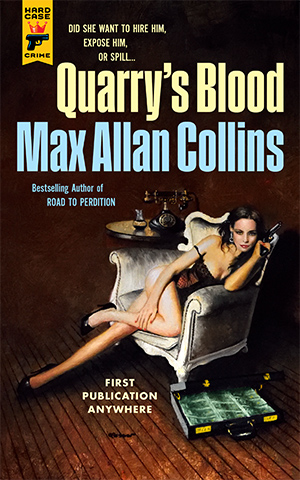No book giveaway this week. To make up for it I am including a cute photo of our two grandchildren, Lucy and Sam, taken at the Muscatine Art Center’s lego display. You’re welcome.


Patience – another book giveaway will come. I just don’t want to detract from the release today (Feb. 22) of Quarry’s Blood. And winners in that book giveaway, will on that date be able to post reviews on Amazon.
And speaking of Quarry’s Blood, I want to share this great review from Ron Fortier at Pulp Fiction Reviews:
By Max Allan Collins
Hard Case Crime
Max Allan Collins has been writing stories about his Vietnam veteran hitman since 1976. It was obvious from the start that the author and his creation were the same age making it easy enough for him to place the stories in time. Collins did a few Quarry books and then walked away from them. When Hard Case Crime came along, publisher Charles Ardai, a fan of the character, urged Collins to bring Quarry back. Collins, obviously older, as was his hero, realized he had a golden opportunity to write a finale.
What his crystal ball couldn’t predict was how successful “The Last Quarry” would become among his ever growing audience. And there was Ardai wanting more. Collins pulled a very neat hat-trick and went backwards with “The First Quarry.” Which of course meant dusting off his own memories of those long ago times and their social environs. All of which he did making it seem effortless.
Having thus given us the alpha and omega, it seemed we mystery/crime fans had seen the last of Quarry. Again we’ve been proven wrong in this new “Quarry’s Blood.” It’s pretty much a gripping fast paced epilogue and so much fun. We catch up with an aging Quarry, almost about to reach seventy and widowed for the second time. He’s content with living a quiet, if lonely life, until a very savvy female writer named Susan shows up on his doorstep. As it turns out she’s the author of a bestselling true crime novel that was clearly inspired by Quarry’s lethal career and she’s convinced he is the real hitman she researched in her book.
Unnerved by all this, he maintains his false innocence and sends her packing. The following day, while taking a pre-dawn swim at a nearby indoor pool, he’s nearly killed by two professional assassins. No way is it a coincidence and Quarry finds himself once again being pulled into his old world of hunter/prey, kill or be killed. But what’s the connection to Susan? And who, after so many long years, wants him dead and why?
This is one of the best Quarry books ever. Maybe we think that because we’re seventy-five, a Vietnam veteran and often times think about all our brothers who never made it home to their families and loved ones. Who never got to drink another cold beer or read a damn good book like this one. Thanks, Max, for all of them.
Thank you, Ron, for reading them. When a Vietnam vet reacts well to these books, I am especially pleased.

Okay, so sometimes I’m wrong.
Ten years ago, I thought The Amazing Spider-man with Andrew Garfield was lousy. But because I really liked the recent Spider-Man: No Way Home, in which all three big screen Spider-men were deftly woven into one narrative, I decided to pick up a 3-D Blu-ray of Amazing Spider-man (cheap) and Barb and I watched it tonight.
We loved it.
Part of this is our affection for Andrew Garfield in other films he’s been in that made us more open to his casting, and of course he’s very good in No Way Home. Part of it was how terrific the film was, really taking its time to explore the origin of the character in a way that was at once faithful to the original comic book and at the same time fleshed it out. Also, the attention by the filmmakers to mimicking artist Steve Ditko’s classic poses for Spider-man was thrilling to someone who had followed the character from Amazing Fantasy #15 and The Amazing Spider-man #1 to the end of the John Romita-drawn run.
Mostly our positive reaction, however, came from meeting the film on its own terms. This is true of novels and short stories, too. I’m a big believer in that, but I sometimes don’t take my own advice. In retrospect, I disliked the Garfield version of Spider-man, ten years ago, because I felt it was superfluous – that it was too soon to do a reboot (a term I don’t believe was in use yet). As a Sam Raimi fan – I saw Army of Darkness in a theater on its first release – I liked his version just fine, though the third one was not up to snuff. But Toby McGuire’s Peter Parker/Spider-man (should I have inserted a “SPOILER ALERT” there?) seemed definitive.
Now reboots are part of the plan, and No Way Home has rather brilliantly found a way to make all three versions of Spider-man at the movies exist in the Marvel Universe.
I mention this not just indicate any growth on my part, but as an adjunct to discussions here (on the update/blog itself and in the comments) about the value of reviews. I don’t recall if I reviewed Amazing Spider-man here ten years ago, but if I did, I probably panned it.
A review is just an opinion, and a snapshot of how the reviewer reacted to a film or novel at that time. Opinions can change, and they often should. I am always after my readers to post reviews at Amazon, and have made my preference for receiving good reviews no secret. But it really doesn’t have much with making me feel good (okay, a little), but mostly to help market the books. To draw attention to them and encourage new readers.
In the comment section last week, Bill P said the following:
I answered this last week, in the comments; but I think Bill raises topics worth discussing in a bit more depth.
I love my readers – money gets sent to my house because of them. But the truth is I write for only two people – Barb and myself. Primarily I write for me, because I am always trying to write a book that I would like to read. I am trying to satisfy my needs and express my ideas and to make something. Create something. Barb is secondary in this process, but incredibly important. I cannot imagine writing if she were not reading what I’ve written.
Now, that doesn’t mean she reads everything – she certainly skips introductions and essays and such that I occasionally write. But all of my fiction goes to her as my first reader (with novels, a chapter at a time). One reason for that is her abilities as a writer – even before she developed her skills along those lines, she had incredible story sense, and a remarkable bullshit detector. She knows when something isn’t working in a scene.
Also, and you’ll have to forgive the sentiment here, but I love her and want to please and impress her. To make her think I was worthy of her spending her life with me. I need to impress her because a lot of the time I am a buffoon.
Being my critic-in-chief isn’t an easy role for her. I hate criticism. I have a thin skin. (Not a desirable trait in a writer.) (Or anyone.) Sometimes I don’t react well. But generally she knows how to handle me (sad that she has to) and I know she is trying to protect me. Yes, from myself.
I don’t make any attempt to please readers by writing the same kind of thing every time out. For a long time, in the movie and TV tie-in days, I had to write all sorts of things to make a living. It was good for me, because I learned a lot writing in different genres – the movie novels, as I’ve mentioned here, included war, western, romance, science-fiction, sword and sorcery, horror and other themes forbidden to me in my narrowly defined role as a mystery writer.
But within mystery fiction, not everything I do pleases every reader of mine. When I do something like John Sand, occasional howls of displeasure have arisen. It’s probably no surprise that fans of Quarry might not be interested in the cozy comic Antiques novels. Quarry and Nolan fans sometimes find the longer length and historical approach of Nathan Heller off-putting, though Heller and Quarry and Nolan are cut from similar cloth.
I can’t help that. First, I need to make a living, and second, I need to stay fresh and interested. If I were doing one Quarry novel after another, in a row, I’d likely grow tired and to hate him. As it is now, it’s like spending time with an old, good friend (who kills people).
I do make concessions both to publishers/editors and to the type of book I’m doing. I have a sense of what’s appropriate for a given title. For John Sand, Matt Clemens and I decided to be very sparing with the “f” word – we hardly use it at all, whereas Quarry and Nolan and Heller readers know I am not fucking afraid to use it. In the Fancy Anders novellas and The Many Lives of Jimmy Leighton, that kind of effing profanity just didn’t seem appropriate. It wouldn’t be in the Antiques novels, either.
To me that’s just bringing to a given novel what is appropriate for that novel, and, yes, its audience. I don’t think that’s selling out – I think it’s being a conscientious professional.
I don’t know how to answer Bill’s archetype question. All of the first-person narrators are me – me in different circumstances, but me. In writing tough guys like Nolan, Quarry, Heller, even Mike Hammer, I strive to make their surfaces – and their inner lives – reflective of each being a real person. Not a type.
M.A.C.
Tags: Movie Reviews, New Releases, Quarry, Quarry's Blood, Reviews











O.K. ya got me I’m going to try a Quarry novel. Any suggestions for a first timer?
Dan,
Options: THE FIRST QUARRY. Chronologically first but written in the second batch.
QUARRY. The first book written about the character.
QUARRY’S CHOICE. My favorite of the later novels dealing with the Broker/hitman period.
THE WRONG QUARRY. My favorite of the later novels dealing with “the list” (Quarry targeting other hitmen).
When I say “later,” I mean the books written for Hard Case Crime, first of which was THE LAST QUARRY.
“All of the first-person narrators are me – me in different circumstances, but me.” And very notably missing from next sentence’s MAC-verse roll call is Mallory, your writer/crime-solver character. I liked his series back then – still do, I guess – and got a good laugh out of its two “con books” with the various writer cameos, among them Don Westlake appearing in at least three guises.
So while you are in coda mode, how about “The Bleeding Crowd”? It _has_ been a bit of a wait … (he chuckled).
Thank you Max I am very excited to read the next Keller novel. Good luck!
Max,
Thanks for commenting on my comment! I consider my question answered. The archetype I was referring to was a certain type of reader, not the protagonist. In a way you do have one, if it is really for you and also your wife. For one on the other side of the biz, I’m always interested in how much of the artist’s vision survives and how much is changed via editorial revisions. I suppose that could fluctuate based on a new vs. established author and also the nature of the given editor. Much like a producer in music, the good ones bring out the best in their artists without taking away the artist’s voice. The heavy-handed ones seem to want to make it more “their vision” rather than the artist’s vision. Your choice of whether or not to use profanity seems in line with the nature of the character themselves as you create them. I’m sure that when writing for Hollywood, it must be more challenging. Then again, he who pays the piper calls the tune!